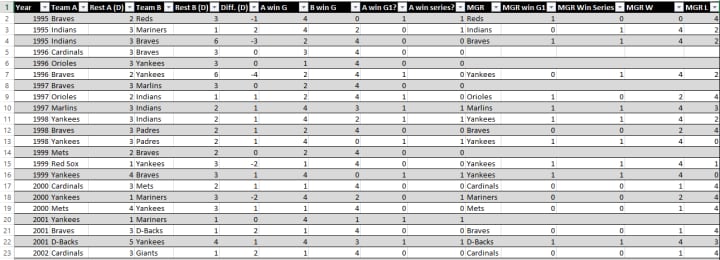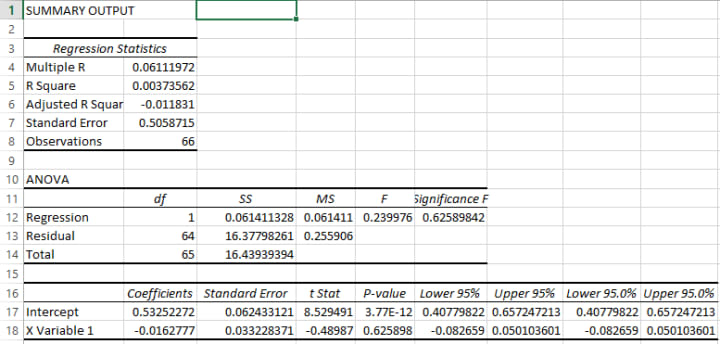The Value of Rest
How important is rest in the playoffs?

If you're reading this, then you probably know that on Tuesday night, the Dodgers and Astros commenced the World Series. Everyone has their own theory as to who's going to win and why. And, as is always the case when two teams go into a series on different lengths of rest, the amount of rest each team has had since their last game features prominently in many theories. A recent article on Unbalanced opined that the extra days off enjoyed by the Dodgers will give them an advantage. Meanwhile, at an earlier stage in the playoffs, at least one television broadcaster expounded during a telecast the notion that extra days off throw a team off its rhythm and give an advantage to its competitor.
Intuitively, I suspect the former opinion is more likely to be true, but there is something to be said for the latter. The Dodgers played a five-game series ending on October 19. The Astros played a seven-game series ending on the 21st. Fewer games played means less strain on the players, particularly the pitchers. More days' rest means more time to recover. Nonetheless, if players hit better when they've made a play in their last defensive inning than when they've been idle — and worse, when they're playing DH than when they're in the defensive lineup — the idea that teams as a whole do better when they've played recently cannot be dismissed, without a good look at the evidence. Both effects, I daresay, exist. The question is: which is stronger?
So, what is the evidence? Well, I could go back through the entire 142-year history of Major League Baseball and record the results of every game ever played in which the two teams had an unequal amount of rest, or I could find a shortcut and give myself some time to sleep. Because I'm lazy, and because stats nerds have lives too, I've decided to take the latter course and look at all the World Series and LCS played between 1995, when the Wild Card system was first in effect, and 2016. Since until recently, each team started the LDS with equal rest, I have ignored these series entirely.
For this project, I am assuming a t-distribution, testing the alternative hypothesis that the amount of rest a team has had prior to a playoff series (measured in days) affects its likelihood of winning said series against the null hypothesis that it does not. I am testing for any effect, positive or negative, at a ten percent significance level. This is equivalent to testing for positive and negative effects simultaneously at a five percent level. The complete list of series analyzed is available in the three screenshots below. The data are drawn from Retrosheet.
Screenshot 1

Screenshot 3

Of the 66 playoff series listed above, 52 have started with the teams on unequal rest. Of those 53, 27 have been won by the team with the most rest, a record of .509. The team with the most rest has won the first game in the series (where one would expect rest to be most important), only 25 times, a .472 winning percentage. Ten times the difference in rest between the teams has been greater than three days. Of those ten series, five have been won by the team with the most rest. Taking every game in these series individually, the team with most rest is 144-153, or .485.
It seems, therefore, the amount of rest a team has had going into a series has little to no effect on its chances of winning, and may even hurt these chances. A simple regression analysis shows a negative correlation between a team's rest "advantage" and its probability of winning the first game, an extra day of rest corresponding to a 0.021 reduction in its chances. For the series as a whole, the regression coefficient between rest and winning is -0.163. In both cases, the correlation coefficient is small, however -0.009553186 in the first case and -0.011831 in the second. This means that if the amount of rest a team has had going into a series does affect its chances, it does so by only a tiny amount: just under one percent in the first game, and just over one percent in the series. Testing for significance at the ten percent level (five percent on each side), we find the evidence is not sufficiently strong to suggest any effect at all. In the first regression (extra rest against first game winning percentage), the test statistic is -0.620418341. In the second (extra rest against series success), it is -0.489873594. Neither case exceeds the critical value (with 65 degrees of freedom) of +/- 1.66863597.
Screenshot 2

Regression 1

Rest Differential against winning Game 1
Regression 2

Rest Differential against winning the series
Going back to the individual games, we find that the data is no more conclusive. The sample standard deviation of a sample of 53 indicator variables with mean 0.48484848... is:
(53/52)*[(0.48484848...*0.51515151...)]^0.5 = 0.504552979.
This gives a test statistic of:
(0.48484848...-0.5)*(53^0.5)/0.504552979 = -0.218618658.
With 52 degrees of freedom, the critical value for a two-tailed t-test at the ten percent level is +/- 1.67468916. I daresay someone somewhere has done a more detailed study than this and can answer this question with far more certitude. But, on the data I analyzed here, one cannot say with confidence that extra days off have any effect at all, good or bad.
If there is an effect, it's at least as likely to be bad. And, with Clayton Kershaw on the mound, many Astros fans will need all the encouragement they can get.
About the Creator
Robert Gregory
Directionless nerd with a first class degree in Criminology and Economics and no clear idea of what to do with it.






Comments
Robert Gregory is not accepting comments at the moment
Want to show your support? Send them a one-off tip.